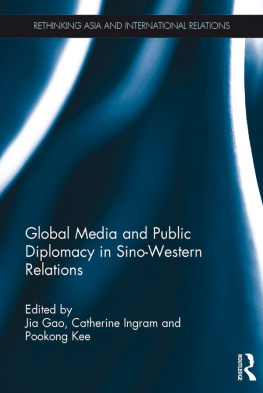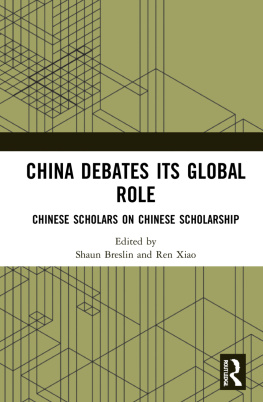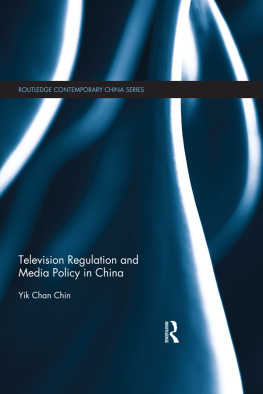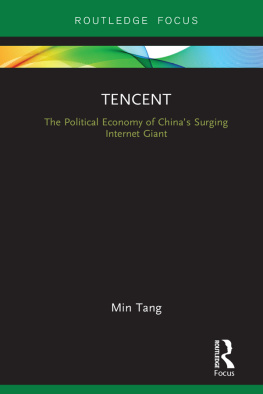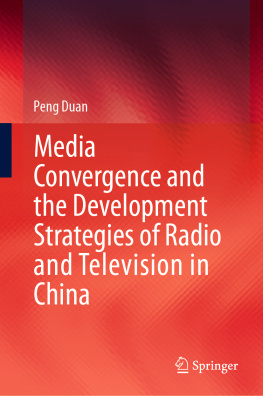CHINAS MEDIA GO GLOBAL
As part of Chinas going out strategy, China is using its media to promote its views and vision to the wider world and to counter negative images in the US-dominated international media. Chinas Media Go Global, the first edited collection on this subject, evaluates how the unprecedented expansion of Chinese media and communications is changing the global media landscape and the role of China within it.
Each chapter examines a different dimension of Chinese medias globalization, from newspapers, radio, film and television, to social media and journalism cultures and practices. Topics include the rise of Chinese news networks, China Daily as an instrument of Chinas public diplomacy and the discussion around the growth of Chinas state media in Africa. Other chapters discuss entertainment television, financial media and the advertising market in China.
Together, this collection of essays offers a comprehensive evaluation of complex debates concerning the impact of China on the international media sphere, and makes a distinctive addition to Chinese media studies, as well as to broader global media discourses. Beyond its primary readership among academics and students, Chinas Media Go Global is aimed at the growing constituency of general readers, for whom the role of the media in globalization is of wider interest.
Daya Kishan Thussu is Professor of International Communication at the University of Westminster, UK.
Hugo de Burgh is Professor and Director of the China Media Centre, University of Westminster, UK.
Anbin Shi is Professor and Director of the Israel Epstein Center for Global Media and Communication at Tsinghua University, Beijing, China.
Internationalizing Media Studies
Series Editor: Daya Kishan Thussu
University of Westminster
For a full list of titles in this series, please visit www.routledge.com/Internationalizing-Media-Studies/book-series/IMS
Internationalizing Media Studies
Edited by Daya Kishan Thussu
Popular Media, Democracy and Development in Africa
Edited by Herman Wasserman
The Korean Wave
Korean Media Go Global
Edited by Youna Kim
Mapping BRICS Media
Edited by Kaarle Nordenstreng and Daya Kishan Thussu
Contemporary BRICS Journalism
Edited by Svetlana Pasti and Jyotika Ramaprasad
Chinas Media Go Global
Edited by Daya Kishan Thussu, Hugo de Burgh and Anbin Shi
First published 2018
by Routledge
2 Park Square, Milton Park, Abingdon, Oxon OX14 4RN
and by Routledge
711 Third Avenue, New York, NY 10017
Routledge is an imprint of the Taylor & Francis Group, an informa business
2018 selection and editorial matter, Daya Kishan Thussu, Hugo de Burgh and Anbin Shi; individual chapters, the contributors
The right of Daya Kishan Thussu, Hugo de Burgh and Anbin Shi to be identified as the authors of the editorial material, and of the authors for their individual chapters, has been asserted in accordance with sections 77 and 78 of the Copyright, Designs and Patents Act 1988.
All rights reserved. No part of this book may be reprinted or reproduced or utilised in any form or by any electronic, mechanical, or other means, now known or hereafter invented, including photocopying and recording, or in any information storage or retrieval system, without permission in writing from the publishers.
Trademark notice: Product or corporate names may be trademarks or registered trademarks, and are used only for identification and explanation without intent to infringe.
British Library Cataloguing-in-Publication Data
A catalogue record for this book is available from the British Library
Library of Congress Cataloging-in-Publication Data
A catalog record for this book has been requested
ISBN: 978-1-138-66584-2 (hbk)
ISBN: 978-1-138-66585-9 (pbk)
ISBN: 978-1-315-61966-8 (ebk)
Typeset in Bembo
by Sunrise Setting Ltd, Brixham, UK
Every effort has been made to contact copyright-holders. Please advise the publisher of any errors or omissions, and these will be corrected in subsequent editions.
CONTENTS
Daya Kishan Thussu, Hugo de Burgh and Anbin Shi
PART I
Conceptualizing the rise of Chinas media
Daya Kishan Thussu
Anbin Shi
Hugo de Burgh
Zhengrong Hu, Deqiang Ji and Yukun Gong
Suzanne Xiao Yang
PART II
Chinese media abroad
Vivien Marsh
Falk Hartig
Kuo Huang
Guoqiang Yun and Jing Wu
Miao Mi
PART III
Discourses of Sino-globalization
Xiaoling Zhang and Zhenzhi Guo
Wanning Sun
Yu Xiang
Jingwei Piao
Qingan Zhou and Yanni Wu
PART IV
Media with Chinese characteristics
Shanshan Lou and Hong Cheng
David Feng
Hong Li and Rong Zeng
Jiao Yang and Mei Wu
Anbin Shi is Ministry of Education Changjiang Endowment Professor of Global Communication, Associate Dean of International Development with the School of Journalism and Communication, and Director of the Israel Epstein Center for Global Media and Communication, Tsinghua University, in Beijing. His research interests include intercultural communication, global communication, public communication, press and politics. He has published Crisis Communication and Media Relations in the Era of Omni-Media (in Chinese, 2014); A Comparative Approach to Redefining Chinese-ness in the Era of Globalization (2003); edited the anthology Mapping Out the Future for Global Communication and Journalism Education (in Chinese, 2014) and co-authored Negotiating Asymmetry: Chinas Place in Asia (University of Hawaii Press, 2009).
Hong Cheng is the Director and a Professor of the Richard Robertson School of Media and Culture at Virginia Commonwealth University in the United States. His research interests centre on international communication, cross-cultural advertising, and social marketing. He co-authored (with Guofang Wan) Becoming a Media Savvy Student (2004) and co-edited (with Kara Chan) Advertising and Chinese Society: Issues and Impacts (2009) and (with Philip Kotler and Nancy Lee) Social Marketing for Public Health: Global Trends and Success Stories (2011). His latest edited book is Handbook of International Advertising Research, published in 2014.
Hugo de Burgh is Professor of Journalism at the University of Westminster and SAFEA (State Administration of Foreign Expert Affairs) Foundation Professor at Tsinghua University. Formerly a British television journalist and producer, his book Investigative Journalism


